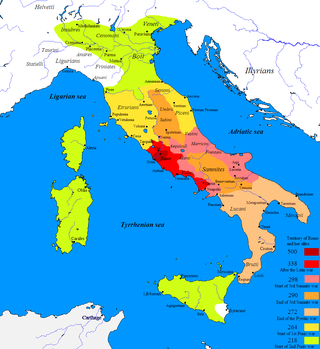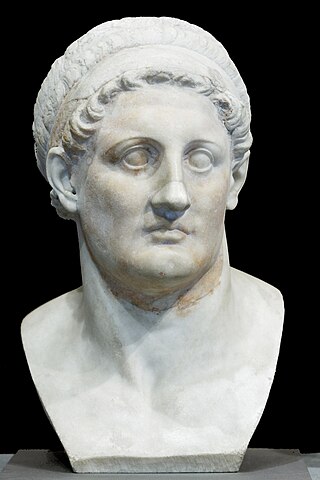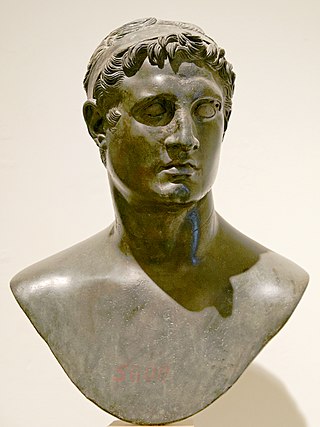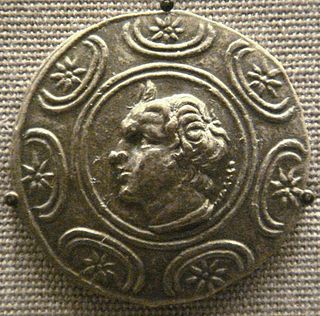This article concerns the period 319 BC – 310 BC.
This article concerns the period 279 BC – 270 BC.
This article concerns the period 269 BC – 260 BC.
This article concerns the period 259 BC – 250 BC.
This article concerns the period 249 BC – 240 BC.

Ptolemy III Euergetes was the third pharaoh of the Ptolemaic dynasty in Egypt from 246 to 222 BC. The Ptolemaic Kingdom reached the height of its military and economic power during his kingship, as initiated by his father Ptolemy II Philadelphus.
Year 246 BC was a year of the pre-Julian Roman calendar. At the time it was known as the Year of the Consulship of Crassus and Licinus. The denomination 246 BC for this year has been used since the early medieval period, when the Anno Domini calendar era became the prevalent method in Europe for naming years.

Year 272 BC was a year of the pre-Julian Roman calendar. At the time it was known as the Year of the Consulship of Cursor and Maximus. The denomination 272 BC for this year has been used since the early medieval period, when the Anno Domini calendar era became the prevalent method in Europe for naming years.
Year 274 BC was a year of the pre-Julian Roman calendar. At the time it was known as the Year of the Consulship of Dentatus and Merenda. The denomination 274 BC for this year has been used since the early medieval period, when the Anno Domini calendar era became the prevalent method in Europe for naming years.

Demetrius I Poliorcetes was a Macedonian Greek nobleman and military leader who became king of Asia between 306 and 301 BC, and king of Macedon between 294 and 288 BC. A member of the Antigonid dynasty, he was the son of its founder, Antigonus I Monophthalmus, and his wife Stratonice, as well as the first member of the family to rule Macedon in Hellenistic Greece.

Ptolemy I Soter was a Macedonian Greek general, historian, and successor of Alexander the Great who went on to found the Ptolemaic Kingdom centered on Egypt. Ptolemy was basileus and pharaoh of Ptolemaic Egypt from 305/304 BC to his death in 282 BC, and his descendants continued to rule Egypt until 30 BC. During their rule, Egypt became a thriving bastion of Hellenistic civilization and Alexandria a great seat of Greek culture.

Ptolemy II Philadelphus was the pharaoh of Ptolemaic Egypt from 284 to 246 BC. He was the son of Ptolemy I, the Macedonian Greek general of Alexander the Great who founded the Ptolemaic Kingdom after the death of Alexander, and Queen Berenice I, originally from Macedon.

Antigonus I Monophthalmus was a Macedonian Greek general and successor of Alexander the Great. A prominent military leader in Alexander's army, he went on to control large parts of Alexander's former empire. He assumed the title of basileus (king) in 306 BC and reigned until his death. He was the founder of the Antigonid dynasty, which ruled over Macedonia until its conquest by the Roman Republic in 168 BC.

Antigonus II Gonatas was a Macedonian Greek ruler who solidified the position of the Antigonid dynasty in Macedon after a long period defined by anarchy and chaos and acquired fame for his victory over the Gauls who had invaded the Balkans.

The Wars of the Diadochi or Wars of Alexander's Successors were a series of conflicts fought between the generals of Alexander the Great, known as the Diadochi, over who would rule his empire following his death. The fighting occurred between 322 and 281 BC.

The Chremonidean War was fought by a coalition of some Greek city-states and Ptolemaic Egypt against Antigonid Macedonian domination. It ended in a Macedonian victory which confirmed Antigonid control over the city-states of Greece.

The Syrian Wars were a series of six wars between the Seleucid Empire and the Ptolemaic Kingdom of Egypt, successor states to Alexander the Great's empire, during the 3rd and 2nd centuries BC over the region then called Coele-Syria, one of the few avenues into Egypt. These conflicts drained the material and manpower of both parties and led to their eventual destruction and conquest by Rome and Parthia. They are briefly mentioned in the biblical Books of the Maccabees.
Patroclus, also spelled Patroklos, was a leading official and admiral of the Ptolemaic Kingdom. He is best known for his activity during the Chremonidean War, when he commanded the navy sent to Greece by Ptolemy II. His early career is obscure, but it must have been distinguished enough for him to rise to the chief priesthood of Alexander and the Theoi Adelphoi in 271/270 BC. After the outbreak of the Chremonidean War, he led a diplomatic and military expedition to the Aegean Sea that expanded Ptolemaic control by establishing bases at Crete, Ceos, Thera, Attica and the Argolid. From these bases he tried, without much success, to aid the Athenians against Antigonus II Gonatas, King of Macedon. He may have been the defeated Ptolemaic commander at the Battle of Cos, which marked the end of Ptolemaic thalassocracy.
The Ptolemaic navy was the naval force of the Ptolemaic Kingdom and later empire from 305 to 30 BC. It was founded by King Ptolemy I. Its main naval bases were at Alexandria, Egypt and Nea Paphos in Cyprus. It operated in the East Mediterranean in the Aegean Sea, the Levantine Sea, but also on the river Nile and in the Red Sea towards the Indian Ocean.
Callicrates or Kallikrates, was a fleet commander (nauarchos) of the Ptolemaic navy, who served under Ptolemy II Philadelphus during the Second Syrian War from 270 to 250 BC.










